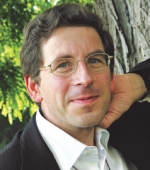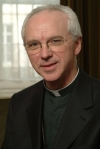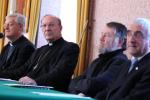In the end, Pope Francis decided to stick to the silent agreement: after a Walloon archbishop of Mechelen-Brussels comes a Flemish one. Succeeding Archbishop André-Joseph, who offered his resignation upon his 75th birthday in May, is Msgr. Jozef De Kesel, until today the Bishop of Bruges, where he succeeded the disgraced Roger Vangheluwe in 2010. Before coming to Bruges, Archbishop-elect De Kesel was auxiliary bishop of Mechelen-Brussels from 2002 to 2010.

The new of Bishop De Kesel’s appointment broke widely in Belgian media yesterday afternoon, but it is only official now, upon the announcement in Mechelen-Brussels and later in Rome.
Bishop Jozef De Kesel is 68, which places him among the older active bishops of Belgium. A long ministry like that of Cardinal Godfried Danneels will not be forthcoming then. As the 24th archbishop of Mechelen-Brussels (before 1961 simply Mechelen), Archbishop De Kesel will lead the archdiocese with its three auxiliary bishops, Jean-Luc Hudsyn, Léon Lemmens (who has been tipped to succeed De Kesel in Bruges) and Jean Kockerols.
Iraq
Bishop De Kesel was most recently in the news because he journeyed to northern Iraq on a mission of solidarity with Tournai’s Bishop Guy Harpigny and Bishop Lemmens, an experience that greatly moved him. He likened it to visiting sick relatives, which is what you do to express your sympathy and concern. Back home in Bruges, Bishop De Kesel began calling on parishes to make housing available for refugees.

^Archbishop-elect De Kesel and Bishop Harpigny in Iraq
Dealing with abuse
Bishop de Kesel has also had to deal with priests who have been guilty of abuse, like more than a few of his colleagues. Through his diocese, Bishop De Kesel has been very open about those dealings, though. In 2014 he appointed a priest who had been found guilty of abuse by a court of law, although any punishment was waived. This priest later chose not to accept the appointment. In recent weeks, Bishop De Kesel had to suspend a priest after he returned to Brazil against previous agreements. He also contacted Brazilian Archbishop Murillo Krieger to warn him against this priest.
First choice
Earlier this year, it became clear that Bishop De Kesel was the first choice to succeed Cardinal Danneels, but that Pope Benedict XVI overrode this choice, as he has the right to, and appointed Archbishop Léonard.
Criticism and views
Bishop De Kesel, while largely popular among faithful in Belgium and abroad, is not without criticism. In 2010 he said he hoped that women could one day be priests, although in 2012 he underlined that the Church is unable to do so. He also believes celibacy for priests should be optional, but also says that this a decision that the Church as a whole should make. No chance of married priests (barring converts or the like) in Brussels anytime soon, then.
While he is a practical man, not blind to the realities around him, the new archbishop does not think that modernisation of Church and priesthood is the answer to everything. In 2013 he said, “Modernising the Church will not mean that people will return.” He added, “More personnel will also not solve our problems. It goes far deeper. Filling as many positions as possible with lay people, or allowing priests to marry, means staying blind to the real problems.” He has a clear vision of the Church, saying in an interview on the occasion of his appointment as auxiliary bishop of Mechelen-Brussels in 2002: “The Church should not be a dictatorship, but neither should she degenerate into a half-hearted thing that denies its own values and visions.”
De Kesel or Bonny?
Some have suggested that Bishop De Kesel is a compromise choice, and that his time as archbishop is intended to prepare the way for Bishop Johan Bonny of Antwerp to succeed him and make the real changes int he archdiocese. Considering that Bishop Bonny will be 67 when Archbishop De Kesel retires (and will have only seven years left before his own retirement), and Pope Francis 87 (if he has not retired by then), this is exceedingly unlikely. A future Archbishop Bonny will have no more time to affect changes than Archbishop De Kesel has now.
 Biography
Biography
Jozef De Kesel was born in 1947 in Ghent and raised in Adegem, halfway between Ghent and Bruges. His father was the town’s mayor, and his uncle, Leo-Karel De Kesel, would be an auxiliary bishop of Ghent for almost three decades. In 1965 he entered seminary and he also studied at the Catholic University of Louvain. He studied theology at the Pontifical University Gregoriana in Rome and was ordained in 1972 by his uncle. In 1977 he became a doctor of theology. In the 1970s he worked as a teacher of religion at several schools, and in 1980 he was appointed as prefect and professor at the seminary in Ghent, teaching dogmatic and fundamental theology, a job he held until 1996. He also taught at the Catholic University of Louvain from 1989 to 1992, and since 1983 he was responsible for the formation of pastoral workers in the Diocese of Ghent. In 1992 he was appointed as episcopal vicar in charge of the whole of the theological education and formation of priests, deacons, religious and laity in the diocese. He also became a titular canon of the St. Bavo cathedral in Ghent. In 2002 he was appointed as auxiliary bishop of Mechelen-Brussels and titular bishop of Bulna. His episcopal motto was inspired by St. Augustine: “Vobiscum Christianus“. Bishop De Kesel was appointed as episcopal vicar for Brussels. In 2010, Archbishop Léonard transferred him to the Flemish Brabant/Mechelen pastoral area. Three months later, Bishop De Kesel was appointed as Bishop of Bruges.
In the Belgian Bishop’s Conference, Archbishop-elect De Kesel is responsible for the Interdiocesan Commission for Liturgical Pastoral Care, for the contacts with the religious, the interdiocesan commission for permanent deacons, the commission fro parish assistants, for bio-ethical questions, for the Interdiocesan Council for Culture, the National Commission for Pastoral Care in Tourism, and for the Union of Women Contemplatives.
Installation
Archbishop-elect will be installed in Mechelen’s cathedral of St. Rumbold on Saturday 12 December.
More to come…
Photo credit: [1] BELGA, [2] Kerknet
 The new bishop, appointed as episcopal vicar for Flemish Brabant and Mechelen, is Msgr. Koen Vanhoutte. The new bishop comes from the Diocese of Bruges, where Cardinal De Kesel was bishop before being appointed to Mechelen-Brussels in 2015. The bishop-elect has served as vicar general of Bruges since 2010, and has been diocesan administrator of that diocese twice: first, in 2010, between the forced retirement of Roger Vangheluwe and the appointment of then-Bishop De Kesel, and then, for the major part of 2016, between the departure of the De Kesel and the appointment of Bishop Lode Aerts.
The new bishop, appointed as episcopal vicar for Flemish Brabant and Mechelen, is Msgr. Koen Vanhoutte. The new bishop comes from the Diocese of Bruges, where Cardinal De Kesel was bishop before being appointed to Mechelen-Brussels in 2015. The bishop-elect has served as vicar general of Bruges since 2010, and has been diocesan administrator of that diocese twice: first, in 2010, between the forced retirement of Roger Vangheluwe and the appointment of then-Bishop De Kesel, and then, for the major part of 2016, between the departure of the De Kesel and the appointment of Bishop Lode Aerts. At 57, the new bishop will be the youngest of the Belgian bishops. A priest since 1984, he is a doctor of theology, taught at the diocesan seminary and was responsible for the youth work, education and formation in Ghent. Earlier this year he was appointed as the dean of Ghent, one of the ten new deaneries created in that diocese.
At 57, the new bishop will be the youngest of the Belgian bishops. A priest since 1984, he is a doctor of theology, taught at the diocesan seminary and was responsible for the youth work, education and formation in Ghent. Earlier this year he was appointed as the dean of Ghent, one of the ten new deaneries created in that diocese.



 Biography
Biography A potentially difficult situation that is bound to raise more than a few eyebrows has developed in the Diocese of Bruges, as Bishop Jozef De Kesel has assigned a priest, who has been found guilty of at least one case of molesting a minor in the past, to the parish federation in Middelkerke, halfway between Ostend and Nieuwpoort on the Belgian coast.
A potentially difficult situation that is bound to raise more than a few eyebrows has developed in the Diocese of Bruges, as Bishop Jozef De Kesel has assigned a priest, who has been found guilty of at least one case of molesting a minor in the past, to the parish federation in Middelkerke, halfway between Ostend and Nieuwpoort on the Belgian coast. “For a period of five years, Tom Flamez was permanently monitored by the house of justice in Courtrai. Even during this time the probation commission had no objections to an eventual appointment as parish priest. Unlike the reporting of some media he never violated the probationary conditions. In January of 2014 the commission of the court of Courtrai decided that the trial period could be ended. Until this day Tom Flamez is sustainably and professionally supervised.”
“For a period of five years, Tom Flamez was permanently monitored by the house of justice in Courtrai. Even during this time the probation commission had no objections to an eventual appointment as parish priest. Unlike the reporting of some media he never violated the probationary conditions. In January of 2014 the commission of the court of Courtrai decided that the trial period could be ended. Until this day Tom Flamez is sustainably and professionally supervised.” It’s been some two years since the Vangheluwe case broke, but recent research by the Catholic University of Louvain indicates that it has done no permanent damage to the Church in Belgium. Although there were some initial reactions – people leaving the Church, opting for fake de-baptisms, and a whole bunch of newspaper articles and other media comments – these have essentially all dried up.
It’s been some two years since the Vangheluwe case broke, but recent research by the Catholic University of Louvain indicates that it has done no permanent damage to the Church in Belgium. Although there were some initial reactions – people leaving the Church, opting for fake de-baptisms, and a whole bunch of newspaper articles and other media comments – these have essentially all dried up. February was the month of
February was the month of  In May we saw and read about
In May we saw and read about  August was a big month because of
August was a big month because of  In November, Cardinal Burke
In November, Cardinal Burke  In his homily at the Chrism Mass yesterday evening, Bishop Gerard de Korte briefly referred to the upheavals in the Church. The Vangheluwe case was mentioned, but also the very recent hubbub about the Volkskrant article, and especially the rumour that Archbishop Eijk wants Bishop de Korte removed from office as ordinary of Groningen-Leeuwarden. In a sort of reply to that whole rumour, he said:
In his homily at the Chrism Mass yesterday evening, Bishop Gerard de Korte briefly referred to the upheavals in the Church. The Vangheluwe case was mentioned, but also the very recent hubbub about the Volkskrant article, and especially the rumour that Archbishop Eijk wants Bishop de Korte removed from office as ordinary of Groningen-Leeuwarden. In a sort of reply to that whole rumour, he said: Almost a year after one of the biggest blows that the Catholic Church in Belgium had to take – the resignation of Bishop Roger Vangheluwe after he admitted having abused a minor – the Congregation for the Doctrine of the Faith published the steps to be taken against the former bishop of Bruges. As the statement issued by Papal Nuncio Archbishop Berloco, says:
Almost a year after one of the biggest blows that the Catholic Church in Belgium had to take – the resignation of Bishop Roger Vangheluwe after he admitted having abused a minor – the Congregation for the Doctrine of the Faith published the steps to be taken against the former bishop of Bruges. As the statement issued by Papal Nuncio Archbishop Berloco, says: